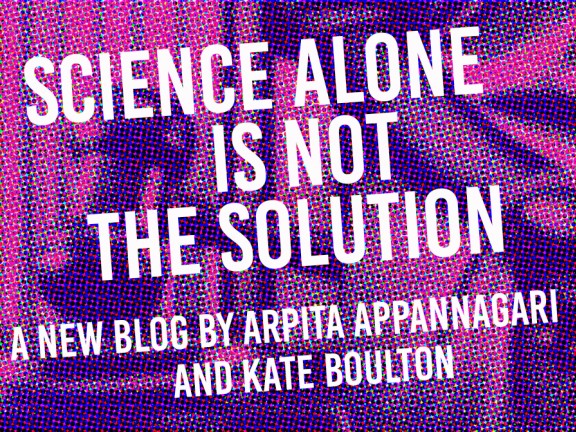Science Alone is Not the Solution

The Expert consensus statement on the science of HIV in the context of criminal law was published in the Journal of the International AIDS Society to coincide with the July 2018 International AIDS Conference (AIDS 2018). The statement summarizes existing science on certain routes of HIV transmission and treatment, with an eye to encouraging better use of HIV science within the criminal justice system.
Based on a review of existing research literature on the possibility of HIV transmission during a single act of spitting or biting, or of anal, vaginal or oral sex, the authors note that the possibility of HIV transmission varies according to a range of factors including viral load, condom use, and other risk reduction practices. They summarize the research to date that “suggests the possibility of HIV transmission during a single episode of sex, biting or spitting ranges from no possibility to low possibility.” They also reference the positive health impact of modern antiretroviral therapies that have improved the life expectancy of most people living with HIV to a point similar to their HIV-negative counterparts. Finally, they describe how phylogenetic analysis alone cannot establish beyond reasonable doubt either the source or direction of transmission in an HIV criminal prosecution.
Documents of this kind can be very useful to advocacy efforts, particularly if they include a set of specific recommendations that serve to support the ongoing work of advocates. But in view of the International AIDS Society’s considerable investment in this process and the many signatories to the statement, we wish it could have gone beyond what already has been described by legal and medical experts in the field, to an unequivocal rejection of HIV criminal laws altogether.
This is not to suggest that the statement has no value or that it cannot be used to support HIV advocacy efforts. A single document that synthesizes the most relevant research studies on transmission risk can be very useful to advocates challenging any form of HIV discrimination. The who-what-when-where matters, too: authored by globally renowned scientists and launched at one of the most visible events in the field of HIV, the statement is intended to be understood as the “gold standard” on the science of risk and transmission. The statement also challenges traditional public health risk terminology as ill-fitted for use in criminal prosecutions, and instead pushes the straightforward continuum of no, negligible, and low risk.
For the Expert consensus statement to conclude that what we really need is “a correct and complete understanding of current scientific knowledge” to “inform any application of the criminal law in cases related to HIV” comes up seriously short. As we see it, dispassionate scientific analysis which summarizes what we already know, without situating that analysis within a broader social justice framework, does not foster change on its own. Efforts to engage with HIV criminalization that fail to consider how the analysis affects those living with other stigmatized diseases such as viral hepatitis and tuberculosis -- or the next virulent retrovirus that emerges -- actually can further entrench use of a unique legal standard that is the heart of the problem with these laws.
The statement chooses to focus on “the possibility of HIV transmission during specific acts that are commonly considered in [HIV criminal] prosecutions” but excludes injection drug use (IDU), mother-to-child-transmission (MTCT), and laws criminalizing solicitation while positive for PLHIV in the sex trade. That choice is unfortunate. People who inject drugs (PWID) are a hyper-criminalized population and experience significant barriers to healthcare access. In the United States, numerous states specifically criminalize needle-sharing by PLHIV. Historically and up to the present, many countries have criminalized women living with HIV in response to behaviors viewed as endangering or harming their unborn child or infant. For example, in 2008 a Florida woman was charged and pled guilty to felony child neglect after “not taking” steps to reduce the risk of vertical transmission of HIV to her child. Data on the enforcement of HIV criminal laws in some U.S. states suggests that sex workers bear the overwhelming brunt of HIV criminalization.
Thus, to exclude PWID, MTCT, and solicitation while positive from an analysis of HIV transmission risk in the context of the criminal justice system is to disconnect the science from the ways in which these laws are unequally applied in reality, and leave open to interpretation the legitimacy of criminalizing PLHIV who inject drugs, sell sex, or are women living with HIV.
The most concerning aspect of the statement is its presumption of the fundamental legitimacy of HIV criminal laws and their application. The statement’s closing recommendation is not that governments and legal systems should reject or challenge HIV criminalization — rather, it is to ensure that HIV criminal prosecutions are consistent with advancements in HIV science. Ultimately, this is a far more conservative recommendation than those issued over the past five years from important scientific and medical associations, including the National Association of State and Territorial AIDS Directors, the HIV Medicine Association, The American Psychological Association or the American Medical Association. As the editorial in the September 2018 edition of The Lancet HIV observes, “[a]longside better use of scientific and medical evidence in legal settings, however, prosecutors, governments, policy makers, and medical and legal professionals must recognize that the only effective approach to ending the HIV epidemic is a rights-based approach.”
In the end, science should be considered just one element of a multifaceted HIV criminal law reform strategy rather than a standalone solution. When it comes to HIV criminalization, science alone won’t win the day, much as it hasn’t in debates about sexual health literacy, reproductive choice, or climate change. Within our movement, failing to acknowledge the fundamentally discriminatory nature of HIV criminal laws, or the racial and economic dynamics of their enforcement, is simply not an option.
Arpita Appannagari, MPH, is National Community Outreach Coordinator at CHLP. Kate Boulton, JD, MPH, is a Staff Attorney at CHLP.
This blog is also on Medium.